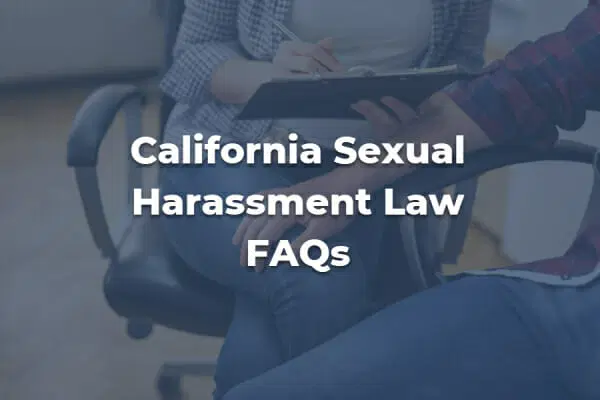
Victim of California Sexual Harassment? 15 Laws & 21 FAQs to Know
Legally reviewed by: Jessica Anvar Stotz, JD, MBA
Updated on: 8/8/2023
As a certified California attorney referral service, we have heard many questions about California sexual harassment laws and the rights these laws entitle you too. Below is a list of common and uncommon questions (and answers) we hear to help answer any you might have as well as help you determine if you have a valid case.
California Sexual Harassment Laws for Victims at a Glance
| Law | Description |
| California Fair Employment and Housing Act (FEHA) (Government Code § 12940) | Prohibits sexual harassment in employment and applies to employers with five or more employees. |
| California Government Code § 12940(j)(4)(C) | Holds employers liable for the acts of non-employees (e.g., clients, customers) who sexually harass employees. |
| California Government Code § 12923 | Extends the statute of limitations for filing a complaint with the Department of Fair Employment and Housing (DFEH) regarding sexual harassment to three years. |
| California Government Code § 12960 | Allows victims of sexual harassment to file complaints with the Department of Fair Employment and Housing (DFEH) within one year from the date of the alleged harassment. |
| California Government Code § 12965 | Provides victims the right to file a lawsuit in civil court against their employers for sexual harassment. |
| California Government Code § 12950-12951 | Requires employers with 50 or more employees to provide sexual harassment prevention training to supervisors and managers. |
| California Government Code § 12940(k) | Prohibits retaliation against an individual who opposes any practices prohibited by FEHA, including opposing sexual harassment. |
| California Government Code § 12940(i) | Prohibits harassment based on gender, including sexual harassment and harassment based on pregnancy. |
| California Government Code § 12926(q) | Defines sexual harassment as unwanted sexual advances, visual, verbal, or physical conduct of a sexual nature. |
| California Civil Code § 51.9 | Allows victims of sexual harassment to sue for damages in certain non-employment contexts, such as business relationships, services, or professional relationships. |
| California Labor Code § 1102.5 | Protects employees from retaliation for disclosing information about sexual harassment in the workplace. |
| California Education Code § 212.5 | Prohibits sexual harassment in educational institutions, including K-12 schools and colleges. |
| California Education Code § 66250-66253 | Requires California community colleges to have procedures for addressing sexual harassment and sexual violence complaints. |
| California Penal Code § 647.6 | Addresses the crime of annoying or molesting a child under 18 years old and includes elements of sexual harassment. |
| California Penal Code § 288.4 | Covers the crime of arranging a meeting with a minor for lewd purposes and involves sexual harassment of a minor. |
Sexual Harassment Quiz
Fill out the questions below to see if you are experiencing sexual harassment and eligible for a potential settlement. This quiz is made specifically for California residents and with the above laws in mind.
1. How does California law define sexual harassment?
California law defines sexual harassment as unwanted sexual advances, requests for sexual favors, or other verbal, visual, or physical conduct of a sexual nature that creates an intimidating, hostile, or offensive work environment or interferes with an individual’s work performance.
It includes conduct on the basis of gender, gender identity, gender expression, or sexual orientation, and can occur between individuals of the same or different sexes.
2. What are the different types of sexual harassment?
The different types of sexual harassment include quid pro quo harassment, where employment decisions or benefits are conditioned on sexual favors, and hostile work environment harassment, which involves unwelcome conduct of a sexual nature that creates an intimidating, hostile, or offensive work environment.
3. What are the federal and state laws that address sexual harassment in California?
Federal laws, such as Title VII of the Civil Rights Act of 1964, prohibit sexual harassment in the workplace nationwide, while California state laws, including the California Fair Employment and Housing Act (FEHA), provide additional protections and remedies for victims of sexual harassment within the state.
4. Who is protected under California’s sexual harassment laws?
California’s sexual harassment laws protect employees, applicants, interns, volunteers, and independent contractors from harassment on the basis of their gender or sex.
5. What is the difference between quid pro quo harassment and hostile work environment harassment?
Quid pro quo harassment involves a direct link between sexual favors and employment decisions. Hostile work environment harassment refers to a work atmosphere permeated by unwelcome sexual conduct that interferes with an individual’s ability to perform their job.
6. Can sexual harassment occur outside of the workplace in California?
Yes, sexual harassment can occur outside of the workplace in California. This can happen in places like social settings or during business trips or events if it is related to employment or affects the victim’s work environment.
7. What are the steps I should take if I experience sexual harassment in California?
If you experience sexual harassment in California, it is important to report it to your employer or the appropriate authority within your organization. Keep records of incidents and follow your employer’s complaint procedure or seek legal advice.
8. How should I document incidents of sexual harassment?
Document incidents of sexual harassment by recording dates, times, locations, people involved, and a detailed description of the events. Preserve any relevant emails, text messages, or other forms of communication as evidence.
9. What are the possible consequences for perpetrators of sexual harassment in California?
Perpetrators of sexual harassment in California may face disciplinary actions by their employer, including termination, as well as potential legal consequences, such as fines or damages awarded to the victim.
10. Can an employer be held liable for sexual harassment committed by an employee?
Yes, employers can be held liable for sexual harassment committed by their employees if they knew or should have known about the harassment and failed to take prompt and appropriate action to prevent or address it.
11. Can an employer be held liable for sexual harassment committed by a non-employee?
Employers can also be held liable for sexual harassment committed by non-employees, such as clients or customers, if they knew or should have known about the harassment and failed to take corrective action.
12. What protections are in place for whistleblowers who report sexual harassment?
Whistleblowers who report sexual harassment in California are protected from retaliation under state and federal laws. They have the right to file a complaint without fear of adverse employment actions.
13. Are there time limits for filing a sexual harassment complaint in California?
In California, there is a statute of limitations for filing a sexual harassment complaint. Generally, you have one year from the date of the last incident to file a complaint with the California Department of Fair Employment and Housing (DFEH).
14. What can I expect during the investigation process if I file a complaint?
During the investigation process, if you file a complaint with the DFEH or the Equal Employment Opportunity Commission (EEOC), they will typically gather evidence, interview witnesses, and assess the merits of your case to determine if there has been a violation of the law.
15. Can I seek compensation for damages if I am a victim of sexual harassment in California?
Victims of sexual harassment in California may be entitled to seek compensation for damages, including emotional distress, medical expenses, and lost wages, through legal action or a settlement agreement. We also wrote an article about the average California sexual harassment settlement amount if you’d like to check that out.
16. What remedies are available for victims of sexual harassment in California?
Remedies available for victims of sexual harassment in California can include monetary damages, injunctive relief (such as a change in workplace policies), reinstatement to a job, or other appropriate actions to address the harm caused.
17. Can I file a lawsuit against my employer for failing to prevent sexual harassment?
In California, employees may be able to file a lawsuit against their employer for failing to prevent sexual harassment if the employer was aware of the harassment and did not take reasonable steps to stop it or failed to adequately address complaints.
18. Can I pursue a sexual harassment claim anonymously in California?
Anonymity may be challenging to maintain throughout the entire legal process, but in some cases, victims of sexual harassment in California can seek to proceed anonymously or with limited disclosure of their identity.
19. Can I still file a complaint if I no longer work for the company where the harassment occurred?
You can still file a complaint if you no longer work for the company where the harassment was occurring, but it is advisable to do so as soon as possible since there may be time limitations for filing a complaint.
20. How do I know if I have a valid case?
Determining the validity of a sexual harassment case requires assessing multiple factors, such as:
- Unwelcome conduct: Assess whether the behavior, advances, requests, or comments of a sexual nature were unwelcome or unwanted.
- Gender or sex-based: Determine if the conduct was based on the individual’s sex, gender, gender identity, gender expression, or sexual orientation.
- Hostile work environment: Evaluate if the conduct created an intimidating, hostile, or offensive work environment that interfered with the individual’s ability to perform their job.
- Severity and pervasiveness: Consider the frequency, severity, and persistence of the alleged harassment to determine if it meets the legal threshold.
- Impact on employment: Examine whether the harassment had a detrimental effect on the individual’s employment, such as job opportunities, promotions, assignments, or work conditions.
- Employer knowledge: Determine if the employer knew or should have known about the harassment but failed to take appropriate action to address it.
- Documentation and evidence: Gather any available evidence, such as emails, text messages, witnesses, or records documenting incidents, which can support the validity of the claim.
- Timeliness: Be aware of the statute of limitations for filing a complaint, as there are specific time limits within which a claim must be filed.
Consulting with a sexual harassment lawyer who can evaluate the specific details of the case is one of the best ways to determine the validity of your case.
21. How can I find a lawyer who specializes in sexual harassment cases in California?
To find a sexual harassment lawyer in California, you can search online legal directories, contact local bar associations for referrals, or seek recommendations from trusted sources familiar with employment law in the state.
*Please note this is not an exhaustive list of questions about sexual harassment laws in California. Each sexual harassment cases is different and exceptions or special circumstances can apply.
Recent Settlements Recovered by LawLinq Lawyer Members
- $6,500,000 settlement awarded to employees at a manufacturing company who discovered a surveillance device had been placed in the workplace restroom
- $2,000,000 settlement awarded for sexual harassment to a woman who claimed she was sexually assaulted by her superior on her first day of work
- $1,850,000 settlement awarded to plaintiffs who alleged sexual harassment by a co-worker and retaliation by their employer.
Get in Touch with a Lawyer
If you have any additional questions we did not answer or you’d like to get in touch with a sexual harassment lawyer in your area, give us a call today. We connect people just like you with top rated attorneys in your area for free.


